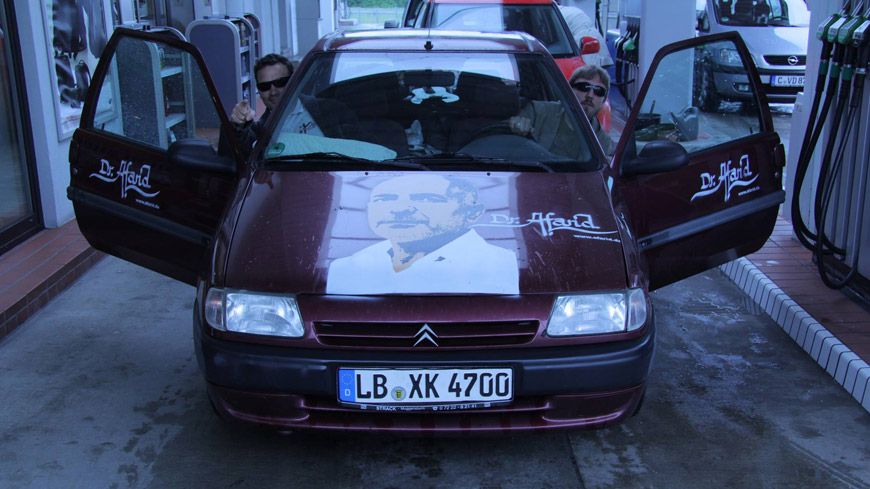Monday, Berlin, June 3rd.
Share
The day has been one of a very hectic kind. It has been a wild trip through Berlin with the afraid-mobile in chase of potential supporters and multipliers and an appointment with a member of parliament. It has been accompanied by a mobile and laptop that decided to go on strike and a stop at a wild internet-cafe in the back of a donut-shop.
But mainly, the most interesting experience of the day was due to three encounters with former asylum-seekers, of which I will now report.
I met Zica, a very sporty, blonde Slovene in a techno-scene-club. It is the sort of club that can only be found in Berlin. When Zica was only six years of age his parents fled with him to Germany, because of the Yugoslavian civil war. They ended up in an asylum-seekers-hostel in Bavaria. Zicas recall about this time is still alive, the experienced still very vivid in his mind, etched into his memory. The hostel was located in a very ugly building, so Zica and the other children tended to through stones at it. Nobody set up any rules that needed following. He and his parents lived in a room no bigger than ten square meters. The whole atmosphere created by the room and the hallways was quite threatening. Several ethnic groups, that had severe problems with each other, were crammed into this place. There were People from Bosnia, Croatia, Serbia, Slovakians. Also there were Albanians, who didn’t get along with anybody. On top of the refugees from the Balkans there were quite a few inhabitants that came from Bulgaria and Russia. A lot of what Zica remembers is hazy, but the constant fight for survival is what he remembers best. There was a constant flow, a coming and going of new inhabitants. Once a week they received a care-package from Caritas or some other help-organisation. Some people traded the needed on the hostels black-market, or went on raids in the local shopping malls and stole some of the needed goods to trade. Some even stole crop from the nearby cornfields. Lucky enough there weren’t many video cameras around the malls in those days, so clothing was easily pinched and sold on to other people living in the same hostel or one of the other nearby asylum-seeker-homes. This was one way to make some money. Zica especially remembers one situation, where somebody he knew managed to smuggle five Jackets out of the warehouse, by stuffing them under his jacket. This fellow threw the jackets on to the table in front of Zica and said, with a raised finger,: “If this Table were longer, I would have brought 15 jackets!” One of the more traumatic memories was due to a birthday party that held given by couple from Bulgaria, who also lived in the same place as Zica. During this party a lot of alcohol was consumed and everybody got very drunk. The place was thick with cigarette smoke. The hosts wife was about to dish out some food, when her husband suddenly jumped up and started to shout at Zica and threw over several plates, smashing them on the floor and purposely started stepping on the remainders, so they would also break. Zica’s mother grabbed her son by the hand and fled the room with her son. The other men stayed in the room and continued arguing.
Zica stayed in the asylum-seekers-hostel for about a year, until his family received a permanent permit of stay for Germany. They were acknowledged as war-refugees by the German government. After this Zica went to school and spent a happy childhood in a small village in Bavaria.
Today Sica has many friends from the former socialist federation of the republic of Yugoslavia. Zica and his family were very lucky, because many refugees were sent back after the war had ended although they now thought of Germany as their new home. Many refugees have to go back to an uncertain future in a country they no longer call their home.

